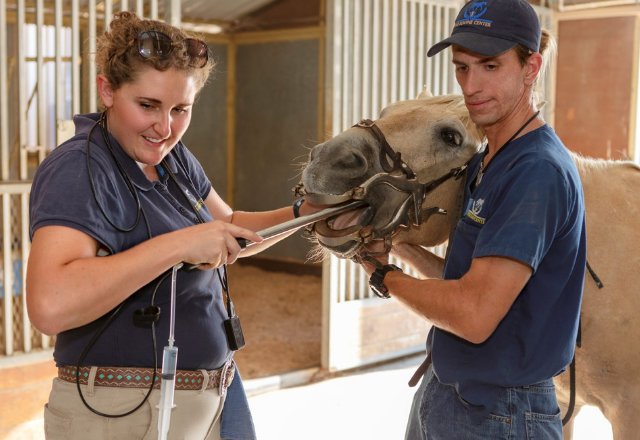Your horse’s mouth, where the carrots, hay and money go, but have you ever had a chance to look inside?
A sedated oral exam with a speculum is a good way for your veterinarian to get a detailed look at the inside of your horse’s mouth. Feeling for sharp points on the upper premolars, while important, can only provide a small piece of the puzzle when it comes to your horse’s true oral health. It is important to catch dental problems early!
A complete and accurate exam of the entire mouth is very important for developing a dental treatment plan. It’s not difficult to see structures such as the interdental space, the canine teeth, and incisors due to their location within the mouth. However, structures located near the back of the mouth are more difficult to see and evaluate. At The Equine Center, we use an oral endoscopic system in order to get a clear view. It is safe and very effective way to see cheek and tongue abrasions, sharp points and periodontal disease.
INDICATORS OF DENTAL PROBLEMS
Look for the following indicators of dental problems to know when to call The Equine Center for a dental exam:
- Loss of feed from mouth while eating, difficulty with chewing, or excessive salivation.
- Loss of body condition.
- Large or undigested feed particles (long stems or whole grain) in manure.
- Head tilting or tossing, bit chewing, tongue lolling, fighting the bit, or resisting bridling.
- Poor performance, such as hanging on the bridle, failing to turn or stop, even bucking.
- Foul odor from mouth or nostrils, or traces of blood from the mouth.
- Nasal discharge or swelling of the face, jaw or mouth tissues.
If your horse is losing weight, has difficulty chewing, or starts behaving abnormally, dental problems should be considered as a potential cause. Waiting too long may increase the difficulty of remedying certain conditions. Horses with dental problems may show obvious signs, such as pain or irritation, or they may show no noticeable signs at all.
Fun Fact – an adult horse has 36-40 teeth! With such a big mouth it can be hard to get a thorough look at each tooth. The Equine Center now has a Dental Endoscope that allows the veterinarian to get a detailed image of each tooth to identify problems early. Since it is almost time for fall vaccines, if your horse has not had their annual physical and dental exam consider calling to schedule an appointment with us today!


